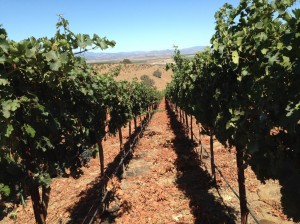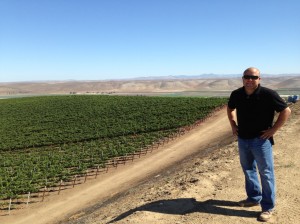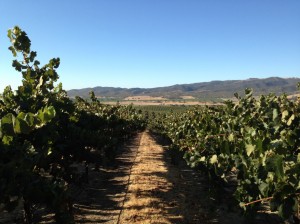
After hand thinning the canopy, shoots are left to decompose on the vineyard floor, adding organic matter to the soil.
Since its founding in 1972, Scheid Vineyards has been committed to sustainable vineyard practices. Irrigation technology helps to reduce water usage; planting of a variety of cover crops between vineyard rows helps to enrich the land, prevent erosion, and promote the sustainable health of the vineyard.
During a recent visit to a few of Scheid’s vineyards, viticulturist Justin Perino described two vineyard blocks with very different management goals on the same land. One of these vineyards was planted on closer vine spacing and is managed to keep yields low and quality high, with the end goal of producing a wine in the $40 plus bottle range. The other block is managed for more moderate to high yields, with the end goal of producing a balanced wine of a lower price point.
The cost to establish and manage the close spaced, low yielding block is significantly greater than that of the vines in the other block, but the higher price point received for the wines makes this type of farming more approachable. Yet, having the balance of both farming models allows for sustainably produced wine grapes for wine consumers of multiple price point categories.
The “Angels Wing” (named after the shape of the block when viewed from aerial maps) was planted over the past 3 years exclusively to Cabernet Sauvignon. If driving south on highway 101, the Angels Wing block can be seen on the east side of the highway, in the southern reach of Monterey County, where it seemingly drops off the face of the earth, exposing the rolling hills in the distance. Several passes are made by hand each year to thin shoots and fruit in this block. The vines are fertilized by hand with composted pomace from the winery blended with manure and straw bedding, providing a stable, slow release fertilizer for the vines. The hand labor and special attention this block receives will pay off in the end, as these grapes will ripen evenly, and with balanced acidity and phenolics that will win a better bottle price for the finished wines.
In a nearby block, the vines are managed with the same stringent attention to sustainable farming practices. The vineyard is maintained with the remaining winter cover crop of barley stubble in every other row to prevent soil erosion and minimizing dust produced by passage of vineyard machinery. Each year the drive rows are alternated to minimize soil compaction and allow for cultivation and incorporation of organic matter from vine debris in the non-drive rows. The vines in this block produce higher yields on wider vine spacing than those in the Angels Wing, however quality is still the objective.
It certainly is nice to have options when it comes to choosing wine from sustainably farmed vineyards. Fortunately for us, Scheid is serving sustainability two ways, allowing us wines from sustainably produced grapes in a price range that all of us can enjoy.



